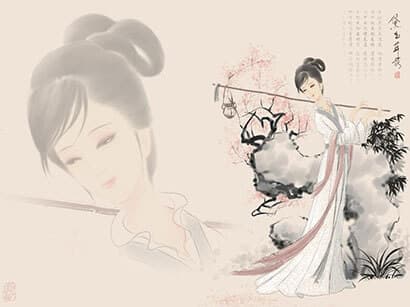The ode to fallen petals
- Poetry of Cao Xueqin

Flowers drifted in the fading season,
who would have a passion for my beauty?
Cobwebs among the trees,willow catkins on the curtain,
a girl like me sighed for this forlorn scenery,
where could i ease off my endless sorrow?
Went out of the boudoir,i carried a hoe,
how could i bear to tramp those frail flowers?
Catkins or sakuras,they just showed their glamour,
who would take care of those fallen peach flowers?
The peach flowers could revive in the next year,
but would i stll stay in my colourful boudoir?
The swallow pecked the petals to decorate her nest,the last hymn of the petals she never reck.
Next year those fallen petals swallows still could peck,
but the nest would fall as my soul falls for him at sight first.
A year was like a hell to me in this Red Chamber,
knife-like wind,sword-like frost,they both tortured the flower.
How long did the flower can insist in this dream's marsh?
everything beautiful just vanished in a flash.
Flowers was easy to see when it bloomed but hard to find when it faded,
how could i find them and bury them in the same grave?
Leaned on the hoe and sprinkled the tears on those withered twigs,
nothing i saw but the red blood.
Cuckoo became quiet,sunset was coming,i threw the hoe and back to my boudoir.
candle light shone the dreams of everyone but i still listened to the rain.
Who would care why i am so sad?Bygone spring,evanescent beauty.
She came so fast,so as she left,what a gloomy goddess from the green heaven!
Last day a bleak sound played outside my boudoir,was flowers weeping
or bird singing?no matter which one played it,they were both moon in the river for me.
I really wished i have two wings to fly,fly to the end of world with those fallen flowers,
but even if i arrived here,was there a place to bury my endless yearning?
Just let me use the sachet to collect these fallen petals,
and bury them with the dirt in the later spring.
May they sleep in the land of promise,
no goblins or devils would disturb their little dreams.
Flowers,now you had me to bury your corpse,but i
didn't know when i would die under this deep-blue sky.
If you didn't believe my words,look this forlorn spring,
fading petals,cold dew and the shy breath of my ardent soul.
After the spring,i'd be the snow girl froze by his sweet smile,
after you rebloom,would he find my crush before my tomb full of the white tulips?
The ode to fallen petals:葬花吟,it's most famous poem of Cao Xueqin,it comes from the novel"Dream of the Red Chamber".Lin Daiyu(林黛玉,a girl) has a crush on Jia Baoyu(贾宝玉,a boy),but she hasn't the courage to confess her love.But she's very frail and gonna die.One day,she saw the fallen petals on the ground and buried them in the Flower Tomb,then she thought she's gonna die but Jia Baoyu still doesn't know her crush,she felt very heartbroken.So she wrote"The ode to fallen petals" to confess her crush and her last love words.
花谢花飞花满天,红消香断有谁怜?
游丝软系飘春榭,落絮轻沾扑绣帘。
闺中女儿惜春暮,愁绪满怀无释处。
手把花锄出绣帘,忍踏落花来复去。
柳丝榆荚自芳菲,不管桃飘与李飞;
桃李明年能再发,明年闺中知有谁?
三月香巢已垒成,梁间燕子太无情!
明年花发虽可啄,却不道人去梁空巢也倾。
一年三百六十日,风刀霜剑严相逼;
明媚鲜妍能几时,一朝漂泊难寻觅。
花开易见落难寻,阶前愁杀葬花人,
独倚花锄泪暗洒,洒上空枝见血痕。
杜鹃无语正黄昏,荷锄归去掩重门;
青灯照壁人初睡,冷雨敲窗被未温。
怪奴底事倍伤神?半为怜春半恼春。
怜春忽至恼忽去,至又无言去未闻。
昨宵庭外悲歌发,知是花魂与鸟魂?
花魂鸟魂总难留,鸟自无言花自羞;
愿侬此日生双翼,随花飞到天尽头。
天尽头,何处有香丘?
未若锦囊收艳骨,一抔净土掩风流。
质本洁来还洁去,强于污淖陷渠沟。
尔今死去侬收葬,未卜侬身何日丧?
侬今葬花人笑痴,他年葬侬知是谁?
试看春残花渐落,便是红颜老死时;
一朝春尽红颜老,花落人亡两不知!
- Why Chinese poems is so special?
- The most distinctive features of Chinese poetry are: concision- many poems are only four lines, and few are much longer than eight; ambiguity- number, tense and parts of speech are often undetermined, creating particularly rich interpretative possibilities; and structure- most poems follow quite strict formal patterns which have beauty in themselves as well as highlighting meaningful contrasts.
- How to read a Chinese poem?
- Like an English poem, but more so. Everything is there for a reason, so try to find that reason. Think about all the possible connotations, and be aware of the different possibilities of number and tense. Look for contrasts: within lines, between the lines of each couplet and between successive couplets. Above all, don't worry about what the poet meant- find your meaning.
- Seven Poems on Kaiyuan Era: Dancing Horses
- Midnight Song of the Four Seasons: Summer
- In Reply to Pimei’s Poem Written During Illness
- Ten Odes on Tea Utensils: Tea Vale White Lotus
- Spring Thoughts II
- The Arcane Celadon of Yue Kiln
- Lodging by Riverside Tower
- Along the River for Flowers Alone I
- The Cottage by the Stream
- The Lotus-Gathering Song